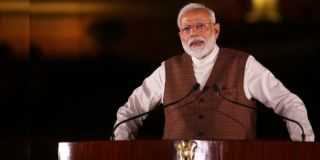Accueil>Style matters: Narendra Modi’s populist discourse and Indian democracy

02.04.2024
Style matters: Narendra Modi’s populist discourse and Indian democracy
À propos de cet événement
Le 02 avril 2024 de 10:30 à 12:30
Salle Pierre Hassner
28 rue des Saints-Pères, 75007, ParisYou’re cordially invited to attend the second research seminar of the new South Asia Program.
Intervenant:
Jean-Thomas Martelli, Post doctorant at CERI-SciencesPo
Discussant:
Jules Naudet, CESAH-EHESS/CNRS
In his exposé of everyday democratic practices, W. H. Morriss-Jones (2015 [1963]) suggested that variations in linguistic idioms—rather than just policy making—characterize meaning-making in Indian politics. Yet the relationship between political power and discursive tropes remains contested in the South Asian context. Ahead of the country’s 2024 general election, “tangible” parameters such as welfare, caste, ethnic consolidation, ideological congruence and party holding are often considered the main drivers of electoral success. In this presentation, I argue that rhetorical style is not a mere ornamental enhancer to achieve political mileage. It rather foregrounds political representation and its "tangible” deliverables through entertaining with it a double relationship of activation and legitimation. By examining the case of populist rhetoric in Indian political speeches and broader media narratives, I build on recent collaborative work to survey the stylistic components that constitute the charismatic political authority of Hindu nationalist leader Narendra Modi, who, in a few weeks' time, will seek a third term as Prime Minister.
Jean-Thomas Martelli is a mixed methods ethnographer in political science and sociology who focuses on what it means to represent politically in contemporary India. His ongoing interdisciplinary project explores the effects of political language on democracy when it transitions to authoritarianism. Through constituting large textual and visual repositories, he researches political discourses at the intersection of online and offline spaces, by examining their effects on populist careers, youth activism, advisory, generational politics, political professionalization, and practices of the self in contemporary India. He is currently a postdoctoral fellow at the Center for International Studies (CERI) at Sciences Po Paris and the Scientific Secretary of the French Association of Political Science (AFSP). Dr. Martelli was a research fellow at the International Institute for Asian Studies at Leiden University and a visiting fellow at the Department of Anthropology at Stanford University. Prior to his tenure at Stanford, he co-headed the Politics and Society research division at the French research unit in India, the Centre de Sciences Humaines (CSH, UMIFRE 20 MEAE-CNRS) in New Delhi—2018-2022. He holds his doctoral degree in political science and sociology—with a focus on contemporary India—from the King’s India Institute, King’s College London.
Scientific coordinator: Christophe Jaffrelot, Sciences Po-CERI